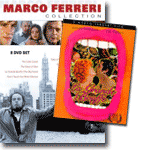 |
|
|||||||||||||||||||||||||||||||||||||||||||||||||||||||||||||
La Grande Bouffe In many ways, 1973 is an underrated, yet important year in film history. It was a year that produced two of the greatest horror films ever made, William Friedkin's The Exorcist Marco Ferreri's La Grande Bouffe The plot is simple yet bizarre. The audience is first introduced to four successful middle-aged businessmen: jet pilot Marcello (Marcello Mastroianni), TV executive Michel (Michel Piccoli), judge Phillipe (Philippe Noiret) and chef Ugo (Ugo Tognazzi). Each initial scene shows the men as they are either leaving work or their home. Though they never say it out loud, it seems clear from their expressions and actions that the men do not plan to come back. They meet at a villa owned by one of them, and two service trucks packed with the finest foods soon arrive. Ugo prepares a lavish feast, and the men begin to eat - and eat, and eat. The purpose of their meeting soon becomes clear: the men are committing group suicide and plan to eat themselves to death. Gorging themselves with one indulgence is not enough, however, as the men hire three prostitutes to share in their gluttony. Also invited, at the behest of Phillipe, is a local schoolteacher, Andrea (Andréa Ferréol). The proceedings then become a literal orgy of sex and food, as the men demand the women eat as much as they do. However, the women soon realize what the men are doing and decide to leave - all except Andrea (why does she stay? Perhaps because it is first time the attractive but overweight Andrea has truly felt like an object of desire). The remainder of the film is an endurance test for the audience as it becomes more and more outrageous, decadent, obscene and flat-out gross. The men (and Andrea) single-mindedly pursue their intention of eating themselves out of existence. Whole turkeys are consumed by each at one sitting. They race to see who can eat the most raw oysters in two minutes. They keep on and on eating even as their bodies begin to break down. In arguably the most disturbing scene in the film, Michel lies on his bed, racked with pain as his intestines start to fail him (he passes gas loudly). Ugo brings in a large serving tray with a giant mound of mashed potatoes. He sits on the bed beside Michel and starts to force-feed the groaning Michel the potatoes. Chillingly, Ugo says, "You must eat, or you will NOT die." There is also clearly a connection between sex and food. The heavyset Andrea (in a moving performance by Ferréol) is often seen nude and is shared by the men like a piece of meat. Furthermore, the last meal of one of the men is a bizarre pink cake that resembles breasts. Ferreri's specialty appears to be the long, still take. The camera will linger on a scene, long after the viewer is ready to turn away. He captures in full detail a scene in which a character suffers one of the most disgusting and degrading death scenes ever filmed. There is also a long take as an over-packed toilet explodes (as bad as it sounds). The camera is also notably impassive near the film's conclusion: as the survivors trudge on and create an enormous duck and goose pate in the kitchen, those who have perished are visible through the glass panes of a meat locker, serenely watching. What is the purpose of such a film? Roger Ebert dismissed it as "essentially just a chronicle of gluttony and self-hate." Others tried to read into it an attack on the modern bourgeoisie French society (the film is clearly open to this interpretation). However, even though I found the film very hard to watch at times, I found an admiration and respect for it, as well as a sense of morality at its core. By fully submitting to the basest human instincts and desires (namely, exciting their physical senses), the men find nothing but pain and death. The happiest moments they find at the end are during the few times they turn away from the food and sex. Marcello is happy when he finds an antique car in the garage, works on it and gets it to run. All enjoy a brief visit from local schoolchildren, whom they feed lunch. Though it is never explained why they entered this pact, there also seems to be true affection among the men for each other. The message I gathered: there is clearly a limit to the joy that the base senses can bring. It is through accomplishment and camaraderie that one can find both happiness and purpose. Marco Ferreri is not as renowned as other European auteur directors, but his work seems ripe for rediscovery, especially La Grande Bouffe |
|
|||||||||||||||||||||||||||||||||||||||||||||||||||||||||||||
|
||||||||||||||||||||||||||||||||||||||||||||||||||||||||||||||
| action | animation | art house/international | comedy | documentary | drama | family | horror/sci-fi | suspense | television | ||||||||||||||||||||||||||||||||||||||||||||||||||||||||||||||
| contact | home | ||||||||||||||||||||||||||||||||||||||||||||||||||||||||||||||


